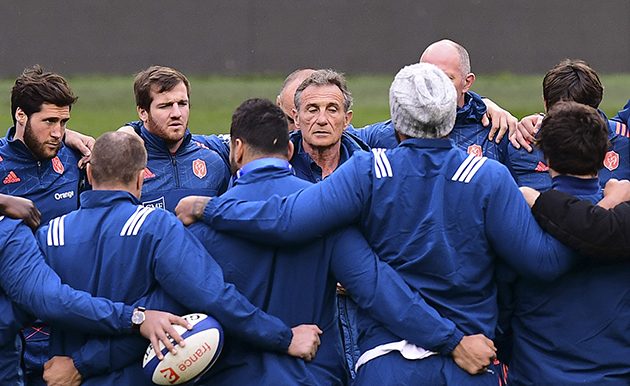In the midst of another disappointing Six Nations campaign, we look at the key problem areas for this France team
It’s now seven seasons and counting since France won the Six Nations. Put another way, this is the worst spell les Bleus have endured in the championship since they failed to get a sniff of the title between 1946 and 1954. The last time they went more than four seasons without at least a share of the Six Nations was in the mid-1960s, a trough from which they emerged in 1967.
France last won the championship in 2010 with a team driven by old warhorses nearing the end of their careers such as Imanol Harinordoquy, Yannick Jauzion, William Servat and Julien Bonnaire. How quickly things fell apart. When France toured New Zealand in the summer of 2013 they were whitewashed in the three-Test series, suffering the humiliation in the second Test of a 30-0 drubbing.
Yannick Bru, forwards coach at the time, lamented the inadequate technical skills of his side, their poor decision-making and their inability to execute in the red zone at key moments. But it was a young squad and he and head coach Philippe Saint-Andre expressed their belief that losing to the All Blacks was no disgrace provided the players learnt the lessons dished out by New Zealand.

Dark day: Bernard le Roux was part of the team that lost 30-0 to New Zealand in 2013. Photo: Getty Images
Four years on and nothing has changed. Players like Bernard le Roux, Yoann Huget, Sebastien Vahaamahina and Yoann Maestri have not grown in stature between touring New Zealand and losing to Ireland on Saturday. Guy Noves, who succeeded Saint-Andre at the end of 2015, admitted on Saturday night: “Talking of progression after this defeat, it’s difficult. I don’t have the impression that we’re progressing… we’re stagnant.”
Not so, said one of his players, Gael Fickou, who asked if he agreed with his coach’s bleak assessment, said: “No, I think we’re continuing to progress. We’ve tested ourselves this weekend against a great side, solid and strong, who dominated the All Blacks not so long ago.”
Fickou is the incarnation of the stagnation of which Noves speaks. Remember when he burst onto the scene five years ago, scoring a memorable try for Toulouse against Leicester in the Heineken Cup? Now look at him. Barely any progression despite his obvious talent. Incidentally, on the bench for Leicester that October day in 2012 was another teenager, George Ford, a player who most definitely has progressed. Like so many of this generation of French players, Fickou seems unwilling to push himself onto the next level.

Moving forward: Gael Fickou insists there are signs of progress. Photo: Getty Images
“A national team which dies is a sport which dies,” said FFR president Bernard Laporte in the aftermath of Saturday’s defeat, a prelude to his declaration that his principal solution to arrest France’s decline is the introduction of 40 central contracts.
In addition, from 2020 onwards he intends to limit the number of players in Top 14 and ProD2 match-day squads who are ineligible to represent France to five. “Ireland have done it,” he said. “I’ll leave time for the (club) presidents to adjust their squads but this work is a priority.”
Yet France’s plight can’t keep being passed off on too many foreigners, many of whom bring with them to the Top 14 skills, experience and a work ethic that have a positive influence on young, home-grown players. There’s another reason for France’s decline which, even if Laporte can’t see it, the fans at least can.
The French sports newspaper, L’Equipe, ran a poll in the wake of Saturday’s defeat to Ireland in Dublin, asking its readers to pinpoint the biggest failing of France. Nearly 50,000 people responded and 38% identified ‘poor technique’ as the greatest deficiency in their team with the absence of a collective strategy second on 18%.
The same newspaper canvassed the opinion of several former France stars as to what’s behind the decline of the national team. “There’s a problem in contact between the ball-carrier and the support player,” said Pierre Berbizier. “‘Should I keep or pass the ball?’ The players don’t understand what to do in situations, that’s the problem.”

Man in the middle: How can Guy Noves get better results from his France team? Photo: Getty Images
Pierre Villepreux agreed. “Individual technique comes with understanding the game,” said the former centre, a member of the French XV that won back-to-back Six Nations titles in 1967 and 1968. “Our internationals know how to pass the ball, but they don’t know how to read the game… (because) young French players are not being raised to understand rugby and the technique that goes with that.”
Unfortunately many of the players of whom Villepreux speaks continue to be in denial, like Francois Trinh-Duc, another player who promised much in his youth before settling down to a decade of underachievement. “The France team is in construction,” he explained on Monday. “Sometimes you must have encouraging defeats.”
If apologists like Trinh-Duc are to be believed, France have been in construction for the past eight years.
The truth is that as rugby has become more professional around the world, the way the game is run in France has stood still. There are too many amateur attitudes from the top down to the bottom; too many coaches are still stuck in the past, too many players lack the mental rigour to work on their skills and their fitness and too many clubs have more money than sense.
Noves is right, France are stagnating. Meanwhile, their opponents are innovating and one wonders what Italy will have up their sleeves for les Bleus on Saturday week?
For the latest Rugby World subscription offers, click here.





